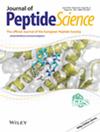肽合成中有争议的命名法:呼吁澄清
IF 1.8
4区 生物学
Q4 BIOCHEMISTRY & MOLECULAR BIOLOGY
引用次数: 0
摘要
由于多肽的高需求,全球采用了各种方法来制造多肽。通常用于此目的的三种主要方法是溶液合成,也称为经典的溶液相肽合成(CSPS),固相肽合成(SPPS)和液相肽合成(LPPS)。每种方法都具有独特的优势:CSPS用于可扩展性,SPPS用于自动化和效率,LPPS用于将解决阶段的简单性与使用可溶性标签的迭代合成相结合。本文章由计算机程序翻译,如有差异,请以英文原文为准。

Controversial Nomenclature in Peptide Synthesis: A Call for Clarity
Various approaches to make peptides have been adopted globally owing to their high demand. The three main approaches commonly used for this purpose are solution synthesis, also called classical solution-phase peptide synthesis (CSPS), solid-phase peptide synthesis (SPPS), and liquid-phase peptide synthesis (LPPS). Each method offers unique advantages: CSPS for scalability, SPPS for automation and efficiency, and LPPS for combining solution-phase simplicity with iterative synthesis using soluble tags.
求助全文
通过发布文献求助,成功后即可免费获取论文全文。
去求助
来源期刊

Journal of Peptide Science
生物-分析化学
CiteScore
3.40
自引率
4.80%
发文量
83
审稿时长
1.7 months
期刊介绍:
The official Journal of the European Peptide Society EPS
The Journal of Peptide Science is a cooperative venture of John Wiley & Sons, Ltd and the European Peptide Society, undertaken for the advancement of international peptide science by the publication of original research results and reviews. The Journal of Peptide Science publishes three types of articles: Research Articles, Rapid Communications and Reviews.
The scope of the Journal embraces the whole range of peptide chemistry and biology: the isolation, characterisation, synthesis properties (chemical, physical, conformational, pharmacological, endocrine and immunological) and applications of natural peptides; studies of their analogues, including peptidomimetics; peptide antibiotics and other peptide-derived complex natural products; peptide and peptide-related drug design and development; peptide materials and nanomaterials science; combinatorial peptide research; the chemical synthesis of proteins; and methodological advances in all these areas. The spectrum of interests is well illustrated by the published proceedings of the regular international Symposia of the European, American, Japanese, Australian, Chinese and Indian Peptide Societies.
 求助内容:
求助内容: 应助结果提醒方式:
应助结果提醒方式:


